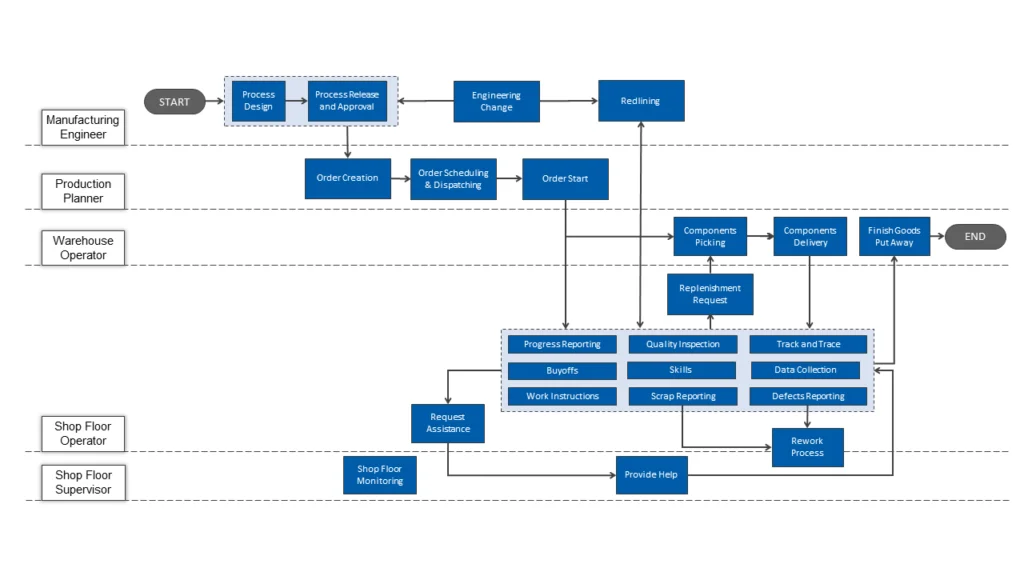The need for manufacturers to keep up with the growing population and supply chain demands calls for a unified solution that’ll allow seamless real-time data collection and monitoring of manufacturing activities across the entire process – thus, the inevitable rise of manufacturing execution systems.
Complex manufacturing is no different in that aspect. We have noticed an increased interest regarding the use of MES in complex assembly, and, as a result, we put together this webinar to address some of your most frequently asked questions. First, let’s expand on the concept of complex production.
Complex Manufacturing is a serialized, slow-moving production characterized by an extended product cycle time and manual labor. Where in batch production manufacturing companies are required to track products by day/batch/lot, complex manufacturing demands for each serialized product unit to be tracked individually.
We recognize three primary production strategies in Complex Manufacturing:
Make to Stock (MTS), where large quantities of the end-product are manufactured based on the anticipated consumer demand. MTS commodities are often stored as inventories until purchased and then shipped to the end-user. You’re most likely to find MTS being used in the automotive and medical devices industries.
Make to Order (MTO), where manufacturing of the end-product only begins when a customer places an order for it. This type of production extends wait time but allows greater flexibility and product customization. You’re most likely to find MTO being used in the aircraft manufacturing industry.
Engineering to Order (ETO), where the end-product is built from scratch based entirely upon customer’s requirements. It’s a highly complex production process that demands close collaboration between engineers (manufacturing company) and the customer. You’re most likely to find ETO being used in the shipbuilding and space industries.
As you can imagine, together with their process flows, the characteristics of Complex Manufacturing pose many challenges for the manufacturers, including:
Below, you’ll find an example of a typical process flow to give you a clearer understanding of what a standard complex assembly process looks like.
We have received multiple questions regarding the application of manufacturing execution systems in complex manufacturing, therefore we decided to address those not only in this webinar but also in the “MES in Complex Assembly” Andea Guide that you can download.
In both, you’ll find answers to the following questions:
James works as the Director of Andea's North American Operations out of Andea's Brea office. He is responsible for managing the company's key functions in North America, including team management, customer and marketing relations, and is responsible for services and project delivery activities. He has over twenty-three years of experience creating innovative solutions and products for the manufacturing sector across various industries. Before joining Andea, James worked at SpaceX for 5½ years, Apriso (now Dassault Systemes) for 12 years, and ProDB Business Systems for 4 Years. James has a broad set of skills and has held various positions, including Lead Product Manager, Solution Architect, Business Analyst, Project Manager, Snr Developer, and Software Development Team Lead. James earned his Bachelor's degree in Information Technology at Griffith University in Brisbane, Australia, in 1996.
Tomasz Gęsiarz is a Service Manager responsible for team management, with particular emphasis on team members' personal development. As a Senior Solution Architect, Tomasz also participates in DELMIA Apriso implementations, where he's responsible for collecting requirements and designing innovative solutions. He has over 15 years of experience working with DELMIA Apriso and worked on projects with manufacturers in various industries. Before joining Andea, Tomasz worked at Apriso for nine years, where he held multiple positions, including; Senior Consultant, Team Leader, and Solution Architect. Tomasz has graduated from the Częstochowa University of Technology, where he received his MSc in Software Engineering and Computer Systems.
Łukasz Horodecki is a Solution Architect at Andea with 20 years of professional experience. He has been working in the MES/MOM space for ten years. Before that, he focused on ERP systems. He worked for clients in private and public sectors, mainly in Europe and the US, and cooperated with European Union's institutions. That gives Łukasz a strong manufacturing, logistics, and financial background, which he uses to contribute to many projects successfully. The main areas of his interests are Aerospace and Defense and Machine Learning (AI). Even in the most challenging situations, he always says: "One thing is for sure; it won't work unless you give it a try." Łukasz has graduated from the University of Economics in Kraków.




